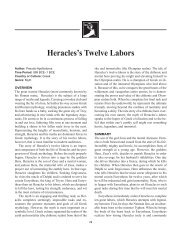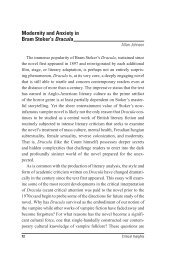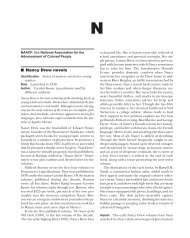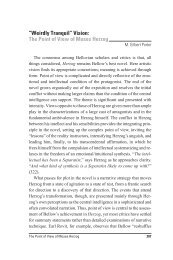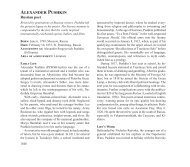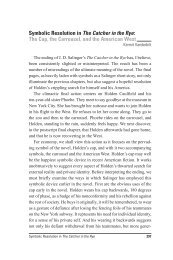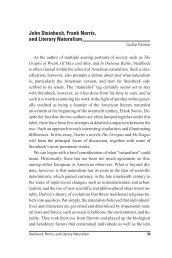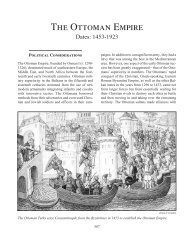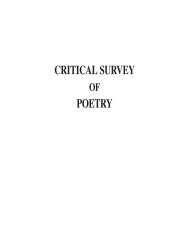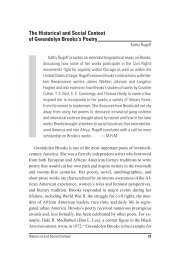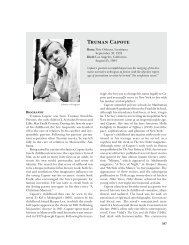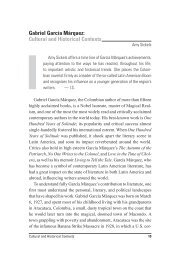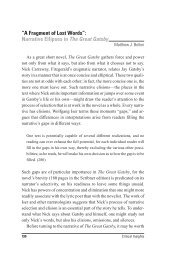Introduction to Poe Criticism Overview: Poe and the ... - Salem Press
Introduction to Poe Criticism Overview: Poe and the ... - Salem Press
Introduction to Poe Criticism Overview: Poe and the ... - Salem Press
You also want an ePaper? Increase the reach of your titles
YUMPU automatically turns print PDFs into web optimized ePapers that Google loves.
len’s focus on <strong>the</strong> economic considerations <strong>Poe</strong> faced, his need <strong>to</strong> win<br />
readers, inspired o<strong>the</strong>rs, including Jonathan Elmer, <strong>to</strong> explore <strong>the</strong> implications<br />
of <strong>Poe</strong>’s role or roles in <strong>the</strong> literary marketplace.<br />
Such analysis as Allen’s leaves some readers unsatisfied. It accounts<br />
for <strong>the</strong> defects in <strong>Poe</strong>’s tales, but <strong>the</strong> defects remain defects. We crave a<br />
“reading” of a tale in which <strong>the</strong> pieces fit <strong>to</strong>ge<strong>the</strong>r <strong>to</strong> serve an artistic<br />
purpose, not just a commercial one. <strong>Poe</strong> himself championed this idea,<br />
which he called “unity of effect.” In order <strong>to</strong> be regarded as great,<br />
should a writer not be in control of <strong>the</strong> effects his or her works have on<br />
readers? If we say that <strong>Poe</strong> is an able writer, <strong>and</strong> if readers commonly<br />
experience parts of his tales as meretricious, vulgar, or silly, <strong>the</strong>n we<br />
should be able <strong>to</strong> account for <strong>the</strong>se reactions in terms of <strong>the</strong> overall design<br />
of <strong>the</strong> tale—especially when <strong>the</strong> passages are so conspicuous, so<br />
pervasive, so seemingly central <strong>to</strong> our experience. Viewing <strong>the</strong> tales as<br />
parodies or hoaxes answers this need.<br />
<strong>Poe</strong> <strong>the</strong> Humorist<br />
Asecond fac<strong>to</strong>r that disposes many <strong>Poe</strong> scholars <strong>to</strong> see humor where<br />
<strong>the</strong> general reader sees only gloom <strong>and</strong> horror is <strong>the</strong> overall context of<br />
<strong>Poe</strong>’s work. Many readers know <strong>Poe</strong> from a h<strong>and</strong>ful of tales: “The Fall<br />
of <strong>the</strong> House of Usher,” “The Tell-Tale Heart,” “The Black Cat,” “The<br />
Cask of Amontillado,” <strong>and</strong> perhaps two or three o<strong>the</strong>rs. It comes as a<br />
surprise <strong>to</strong> such readers that of <strong>Poe</strong>’s more than sixty tales, about half<br />
are openly comical.<br />
“The System of Doc<strong>to</strong>r Tarr <strong>and</strong> Professor Fe<strong>the</strong>r” tells of a man<br />
who visits a mental hospital known for its revolutionary methods. The<br />
man is invited <strong>to</strong> stay for dinner by his hosts, who grow wilder through<br />
<strong>the</strong> evening until it is finally revealed that <strong>the</strong>se are in fact <strong>the</strong> inmates,<br />
who have overpowered <strong>the</strong>ir keepers <strong>and</strong> taken over <strong>the</strong> asylum. In<br />
“The Duc de L’Omelette,” a French duke dies <strong>and</strong> goes <strong>to</strong> hell. He maneuvers<br />
<strong>the</strong> devil in<strong>to</strong> a game of cards <strong>and</strong> escapes damnation by defeating<br />
him—palming a king while <strong>the</strong> devil takes a drink of wine.<br />
<strong>Introduction</strong> <strong>to</strong> <strong>Poe</strong> <strong>Criticism</strong> 47



